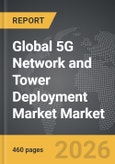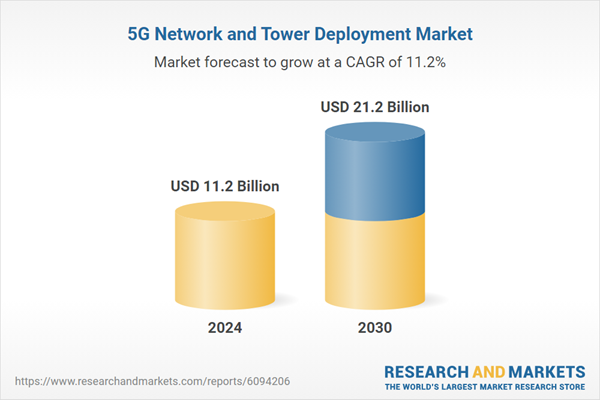Global 5G Network and Tower Deployment Market - Key Trends & Drivers Summarized
Why Is 5G Network and Tower Deployment a Strategic Imperative for Enabling Next-Gen Connectivity, Economic Digitization, and Infrastructure Modernization?
5G network and tower deployment is at the core of the global digital infrastructure race, enabling ultra-fast, low-latency, and high-capacity connectivity essential for advanced technologies such as autonomous mobility, smart cities, telemedicine, and the industrial internet of things (IIoT). Unlike previous generations, 5G requires a dense network of towers, small cells, and distributed antenna systems (DAS) to deliver consistent performance across urban, suburban, and rural environments. This densification is transforming telecom infrastructure from a coverage-oriented model to one focused on performance, scalability, and application agility.Governments and telecom regulators are treating 5G deployment as a national priority, recognizing its role in driving GDP growth, industrial competitiveness, and digital inclusion. Spectrum auctions, policy incentives, and public-private partnerships are accelerating investment in macro towers, rooftop installations, and smart pole infrastructure to close coverage gaps and extend 5G reach. With growing demand for fixed wireless access, private networks, and smart grid communications, the pressure to rapidly deploy multi-layered tower networks is intensifying across developed and emerging markets alike.
As enterprises demand reliable edge connectivity for automation, real-time analytics, and virtual collaboration, tower operators and mobile network providers are aligning their strategies to support ultra-reliable low-latency communication (URLLC) and massive machine-type communication (mMTC). The deployment of 5G towers is no longer about radio coverage alone - it is about building adaptive, software-defined, and revenue-generating infrastructure that serves as the physical gateway to an intelligent, connected future.
How Are Infrastructure Sharing, Small Cell Expansion, and Neutral Host Models Transforming 5G Tower Economics and Deployment Efficiency?
To accelerate rollout while controlling capital expenditure, mobile network operators are increasingly embracing infrastructure sharing models - both passive (tower, power, and site sharing) and active (spectrum and RAN sharing). These arrangements reduce duplication, optimize spectrum utilization, and expand geographic reach faster than standalone deployment strategies. Towercos and infrastructure REITs are capitalizing on this trend by leasing space to multiple tenants, enabling scalable, cost-effective expansion of 5G tower footprints.Small cell deployment is another critical enabler, especially in high-density urban areas where macro towers alone cannot meet capacity and latency demands. Installed on street furniture, building facades, and utility poles, small cells improve network density and throughput in localized zones such as transit hubs, stadiums, campuses, and business parks. Their deployment requires streamlined permitting processes, compact design, and integration with fiber or microwave backhaul - factors that are shaping public policy and vendor innovation.
Neutral host infrastructure is gaining traction as enterprises and venue owners seek multi-operator, future-ready indoor and campus coverage. Neutral host towers and DAS systems allow multiple service providers to operate through a shared infrastructure layer, reducing environmental and visual impact while improving service continuity. This model is especially relevant for industrial parks, airports, commercial real estate, and smart city zones where connectivity expectations are high, but real estate and deployment timelines are constrained.
Which Deployment Strategies, Regional Priorities, and Market Segments Are Driving 5G Network and Tower Expansion Globally?
Macrocell deployment remains foundational in initial 5G rollouts, providing wide-area coverage in suburban and rural areas. Operators are upgrading existing 4G tower sites with 5G antennas and Massive MIMO units to support spectrum efficiency and beamforming capabilities. In dense urban markets, layered deployment strategies combining macrocells, small cells, and indoor systems are ensuring seamless user experience. Fiberization of tower sites and investment in high-capacity fronthaul/backhaul are critical for supporting higher data throughput and network reliability.Asia-Pacific leads global 5G tower deployment, with China, South Korea, and Japan executing aggressive national strategies supported by vertically integrated infrastructure ecosystems. North America, particularly the U.S., is focused on accelerating mid-band spectrum utilization and suburban coverage expansion through partnerships with tower companies and neutral hosts. Europe is balancing deployment with environmental regulation, energy use targets, and cybersecurity oversight, creating a mixed-speed rollout environment across member states.
Emerging economies in Latin America, Africa, and Southeast Asia are prioritizing urban coverage and industrial corridor connectivity, often through government-backed infrastructure funds or operator alliances. Use cases such as digital agriculture, tele-education, and rural broadband access are influencing tower placement and site prioritization. Across all regions, demand from enterprises for private 5G networks in logistics, energy, manufacturing, and healthcare is creating new verticalized tower deployment opportunities beyond traditional consumer mobile services.
What Forces Are Shaping the Strategic Future of 5G Tower Deployment in the Context of Evolving Network Architectures and Market Demands?
The future of 5G tower deployment is increasingly defined by software-defined networking, AI-enabled site optimization, and integration with edge computing and open RAN ecosystems. Tower infrastructure is evolving from static passive assets to dynamic digital nodes that host compute, caching, and intelligent management functions. This convergence allows operators to deliver differentiated services - such as network slicing, mobile edge computing (MEC), and mission-critical connectivity - directly from tower sites.Regulatory frameworks around EMF exposure, visual pollution, land access, and data localization are playing a larger role in shaping deployment timelines and architecture. Sustainability is also becoming a strategic imperative, pushing tower operators to adopt solar and hybrid energy solutions, energy-efficient hardware, and shared power systems. The need to balance dense urban capacity with remote area inclusion is creating dual-track deployment strategies that require flexible financing, adaptive zoning, and collaborative planning.
As next-generation technologies such as 6G, autonomous systems, and immersive digital environments emerge, 5G towers will serve as a foundational infrastructure layer enabling intelligent, pervasive connectivity. With vertical integration of cloud, AI, and telecom networks underway, could 5G tower deployment shift from being a telecom strategy to becoming the structural backbone of a digitally integrated global economy?
Report Scope
The report analyzes the 5G Network and Tower Deployment market, presented in terms of market value (US$). The analysis covers the key segments and geographic regions outlined below:- Segments: Component (5G Small Cell Deployment, 5G Mobile Core Network, 5G Radio Access Network); Location (Ground Tower, Rooftop Tower); Small Cell Tower (Femtocell Tower, Picocell Tower, Microcell Tower); Frequency Band (Low Frequency Band, Medium Frequency Band, High Frequency Band).
- Geographic Regions/Countries: World; United States; Canada; Japan; China; Europe (France; Germany; Italy; United Kingdom; Spain; Russia; and Rest of Europe); Asia-Pacific (Australia; India; South Korea; and Rest of Asia-Pacific); Latin America (Argentina; Brazil; Mexico; and Rest of Latin America); Middle East (Iran; Israel; Saudi Arabia; United Arab Emirates; and Rest of Middle East); and Africa.
Key Insights:
- Market Growth: Understand the significant growth trajectory of the 5G Small Cell Deployment segment, which is expected to reach US$10.5 Billion by 2030 with a CAGR of a 9.3%. The 5G Mobile Core Network segment is also set to grow at 13.7% CAGR over the analysis period.
- Regional Analysis: Gain insights into the U.S. market, valued at $3.1 Billion in 2024, and China, forecasted to grow at an impressive 14.9% CAGR to reach $4.3 Billion by 2030. Discover growth trends in other key regions, including Japan, Canada, Germany, and the Asia-Pacific.
Why You Should Buy This Report:
- Detailed Market Analysis: Access a thorough analysis of the Global 5G Network and Tower Deployment Market, covering all major geographic regions and market segments.
- Competitive Insights: Get an overview of the competitive landscape, including the market presence of major players across different geographies.
- Future Trends and Drivers: Understand the key trends and drivers shaping the future of the Global 5G Network and Tower Deployment Market.
- Actionable Insights: Benefit from actionable insights that can help you identify new revenue opportunities and make strategic business decisions.
Key Questions Answered:
- How is the Global 5G Network and Tower Deployment Market expected to evolve by 2030?
- What are the main drivers and restraints affecting the market?
- Which market segments will grow the most over the forecast period?
- How will market shares for different regions and segments change by 2030?
- Who are the leading players in the market, and what are their prospects?
Report Features:
- Comprehensive Market Data: Independent analysis of annual sales and market forecasts in US$ Million from 2024 to 2030.
- In-Depth Regional Analysis: Detailed insights into key markets, including the U.S., China, Japan, Canada, Europe, Asia-Pacific, Latin America, Middle East, and Africa.
- Company Profiles: Coverage of players such as Alibaba Group Holding Limited, AMD (Advanced Micro Devices, Inc.), Apple Inc., Barco NV, Cisco Systems, Inc. and more.
- Complimentary Updates: Receive free report updates for one year to keep you informed of the latest market developments.
Some of the 34 companies featured in this 5G Network and Tower Deployment market report include:
- 5G LLC
- A5G Networks
- Airspan Networks Inc.
- Altiostar
- American Tower Corporation
- AT&T Inc.
- Baicells Technologies Co., Ltd.
- Cellnex Telecom S.A.
- China Mobile
- China Telecom
- China Tower Corporation
- Cisco Systems, Inc.
- Comba Telecom Systems Holdings Ltd.
- CommScope Inc.
- Crown Castle International Corp.
- Deutsche Telekom AG
- DISH Network Corporation
- Ericsson
- Helios Towers plc
- Hewlett Packard Enterprise (HPE)
This edition integrates the latest global trade and economic shifts into comprehensive market analysis. Key updates include:
- Tariff and Trade Impact: Insights into global tariff negotiations across 180+ countries, with analysis of supply chain turbulence, sourcing disruptions, and geographic realignment. Special focus on 2025 as a pivotal year for trade tensions, including updated perspectives on the Trump-era tariffs.
- Adjusted Forecasts and Analytics: Revised global and regional market forecasts through 2030, incorporating tariff effects, economic uncertainty, and structural changes in globalization. Includes historical analysis from 2015 to 2023.
- Strategic Market Dynamics: Evaluation of revised market prospects, regional outlooks, and key economic indicators such as population and urbanization trends.
- Innovation & Technology Trends: Latest developments in product and process innovation, emerging technologies, and key industry drivers shaping the competitive landscape.
- Competitive Intelligence: Updated global market share estimates for 2025, competitive positioning of major players (Strong/Active/Niche/Trivial), and refined focus on leading global brands and core players.
- Expert Insight & Commentary: Strategic analysis from economists, trade experts, and domain specialists to contextualize market shifts and identify emerging opportunities.
Table of Contents
Companies Mentioned (Partial List)
A selection of companies mentioned in this report includes, but is not limited to:
- 5G LLC
- A5G Networks
- Airspan Networks Inc.
- Altiostar
- American Tower Corporation
- AT&T Inc.
- Baicells Technologies Co., Ltd.
- Cellnex Telecom S.A.
- China Mobile
- China Telecom
- China Tower Corporation
- Cisco Systems, Inc.
- Comba Telecom Systems Holdings Ltd.
- CommScope Inc.
- Crown Castle International Corp.
- Deutsche Telekom AG
- DISH Network Corporation
- Ericsson
- Helios Towers plc
- Hewlett Packard Enterprise (HPE)
Table Information
| Report Attribute | Details |
|---|---|
| No. of Pages | 460 |
| Published | January 2026 |
| Forecast Period | 2024 - 2030 |
| Estimated Market Value ( USD | $ 11.2 Billion |
| Forecasted Market Value ( USD | $ 21.2 Billion |
| Compound Annual Growth Rate | 11.2% |
| Regions Covered | Global |









